This article mentions: Unwanted pregnancies, STI/Ds, rape
There are lots of contraception options out there that all do different things! The main reasons to use contraception is to (A) help prevent STI/Ds and (B) help prevent unwanted pregnancies. To find out more about STI/Ds and unwanted pregnancies, visit our ‘Exploring Sexual Health’ article
Thankfully in the UK you can get contraception free from your local GP and sexual health clinics – yay!
If you over 13 years old, you can, confidentially, speak to your local GP (you don’t need parental consent) where they will provide you contraception advice and treatment if they believe you are a competent young person (using the Fraser criteria).
Before we delve into contraceptive options, let’s throw the myths and rumours away;
“If I pull out when I ejaculate, there’s no risk of pregnancy”
False! There is in fact sperm in pre-ejaculation fluid (sometimes called pre-cum), which leaks out of a penis when it is erect. Therefore, sperm can reach the vagina before the penis has actually ejaculated.
“If I wear more than one condom, I'll be extra safe”
Actually the opposite... Using more than one condom actually causes more friction, meaning it is more likely to tear or break. However, having multiple condoms available in case one breaks, is a smart move.
“Condoms break easily”
Wrong! Condoms are made of sturdy latex, however they only work if you put them on carefully. Make sure there are no air bubbles and the end by squeezing the top as you roll it down. Also be careful of sharp nails, jewellery or teeth.
“I'm on the pill so I don’t need to use condoms”
Not necessarily... Hormonal contraceptives don’t protect you or your partner from STIs. So, if you are having sex with a new partner, you should both get tested and use condoms in the meantime.
“If I ask my partner to use a condom, they’ll think I’m weird”
When having sex with someone, they should respect your decisions. Therefore, if you feel more comfortable having sex with a condom, they should 100% listen and respect that decision.
“If I take a condom off half way through sex, I don’t need to tell my sexual partner”
Actually the opposite! If you begin having sex with a condom and purposefully take it off without consent, this is actually classed as rape. As not everyone has consented to this type of sex (unprotected sex). Communication is key – tell your partner you want to take your condom off/replace the condom and only continue having sex until everyone has consented.
So now we’ve got some myths debunked, let’s talk about contraceptives.
- Contraceptives that help prevent STI/Ds:
Condoms are the only form of contraception that help protect you from some STI/Ds (but not all STI/Ds, so it’s important you get tested if you show any signs of an STI/D, even if you wore a condom).
Condoms can come in 2 forms, internal and external condoms.
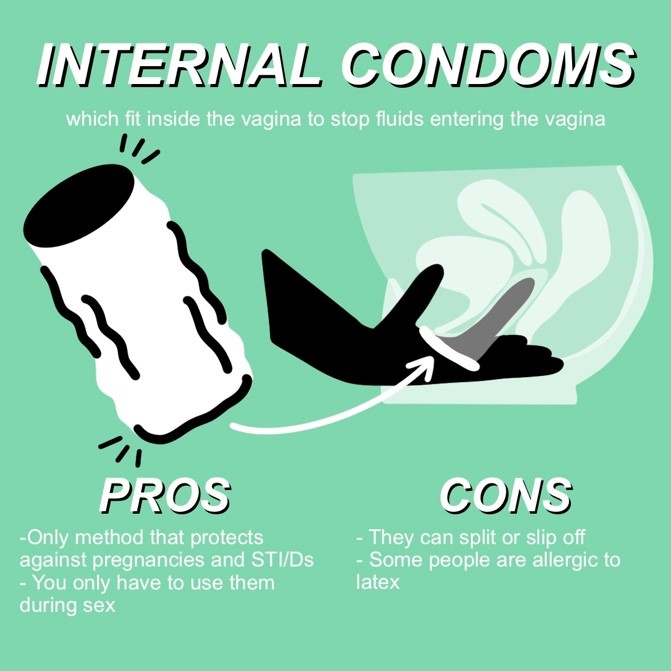
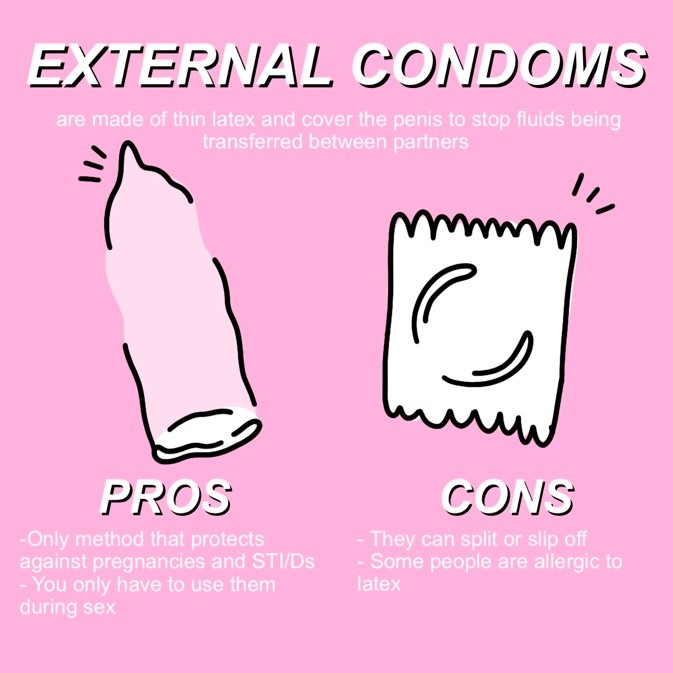
Internal condoms which fit inside the vagina to stop fluids entering the vagina
Pros – Only method that protect against pregnancies and STI/Ds, you only have to use them during sex (including oral sex)
Cons – They can split or slip off, some people are allergic to latex
External condoms are made of thin latex and cover the penis to stop fluids being transferred between partners
Pros - Only method that protect against pregnancies and STI/Ds, you only have to use them during sex (including oral sex)
Cons – They can split or slip off, some people are allergic to latex
- Contraceptives that help prevent unwanted pregnancies:
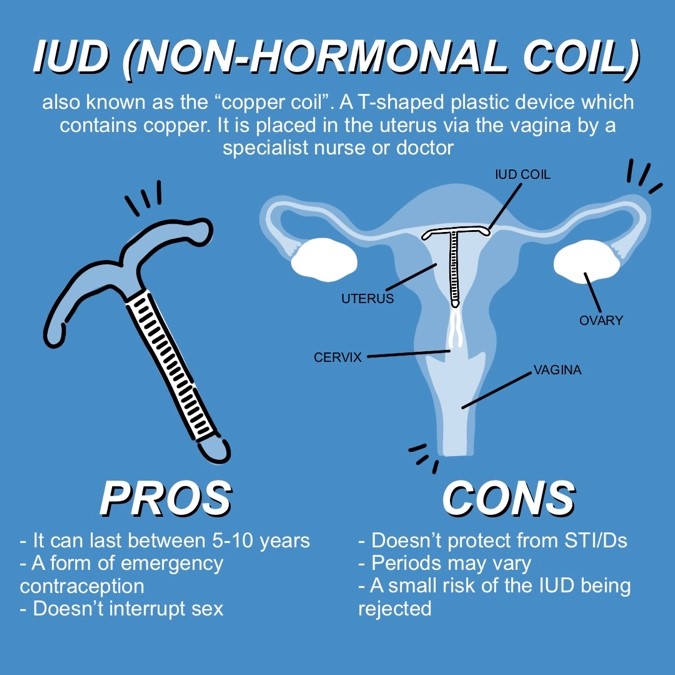
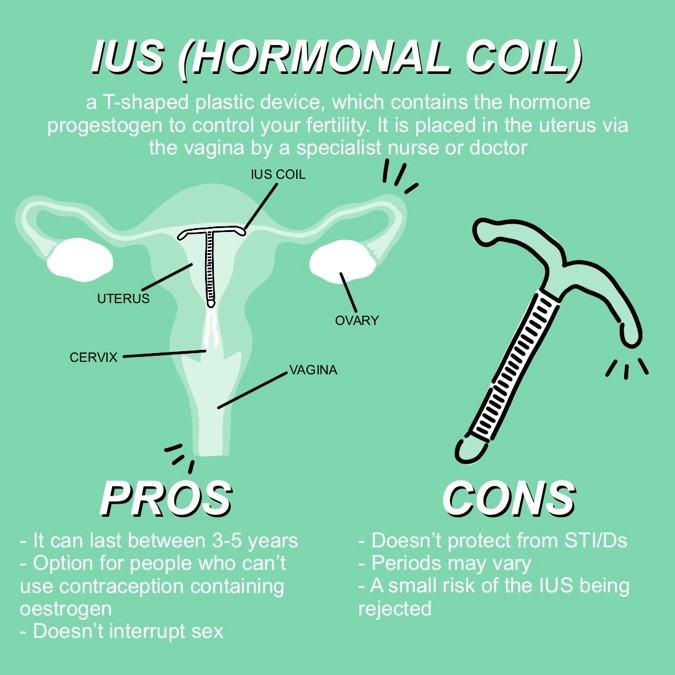
IUD (Intrauterine Device) AKA - Non-hormonal Coil also known as the “copper coil”. A T-shaped plastic device which contains copper. It is placed in the uterus via the vagina by a specialist nurse or doctor.
Pros – It can last between 5-10 years, a form of emergency contraception, doesn’t interrupt sex
Cons – Doesn’t protect from STI/Ds, periods may vary, A small risk of the IUD being rejected
IUS (Intrauterine Device) AKA – Hormonal Coil also known as a “the coil”. A T-shaped plastic device, which contains the hormone progestogen to control your fertility. It is placed in the uterus via the vagina by a specialist nurse or doctor.
Pros - It can last between 3-5 years, option for people who can’t use contraception containing oestrogen, doesn’t interrupt sex
Cons - Doesn’t protect from STI/Ds, periods may vary, A small risk of the IUD being rejected


Implant is a small, flexible plastic rod that is placed just under the skin in the upper arm. It releases the hormone, progestogen.
Pros – It doesn’t interrupt sex, it lasts 3 years, option for people who can’t use contraception containing oestrogen
Cons – Doesn’t protect from STI/Ds, may cause irregular periods, can cause temporary side effects (headaches, nausea, mood swings)
Injection, containing progestogen that you take every 8-13 weeks (depending on the injection)
Pros – It doesn’t interrupt sex, it lasts 8-13 weeks, option for people who can’t use contraception containing oestrogen
Cons – Doesn’t protect from STI/Ds, may cause irregular periods, can cause temporary side effects (headaches, nausea, mood swings)
Emergency Contraception:
There are 2 types of emergency contraceptive, IUD (mentioned above) and emergency contraceptive pills (also known as the “morning after pills”). If you have unprotected sex you may be able to prevent pregnancy by using emergency contraceptive pill within the first 5 days.
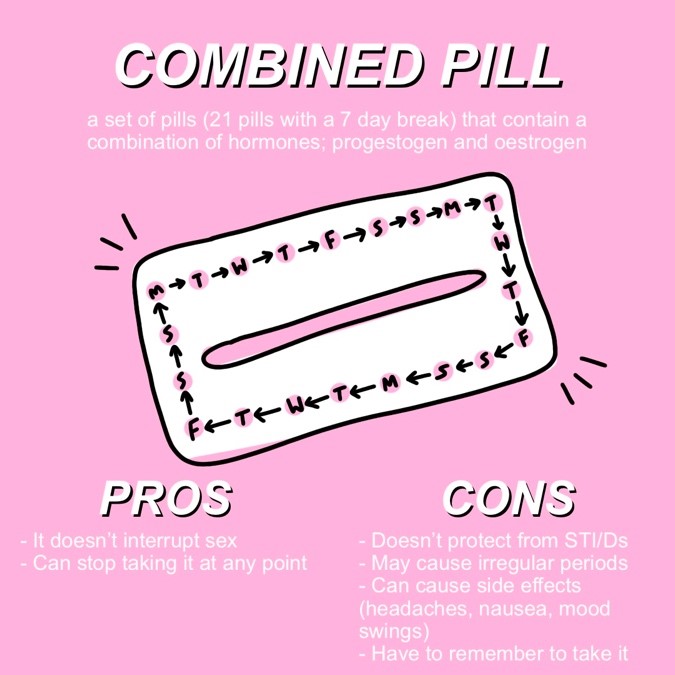
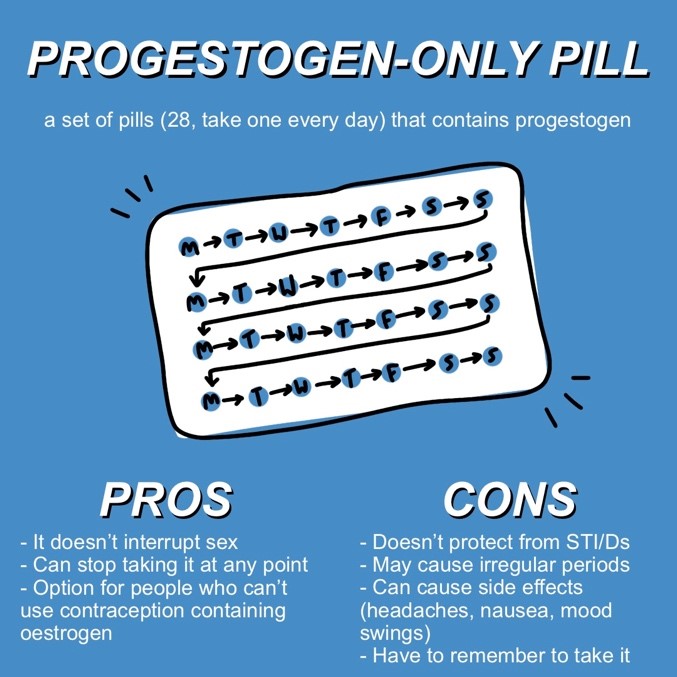
Combined Pill, a set of pills (21 pills with a 7 day break) that contain a combination of 2 hormones; progestogen and oestrogen.
Pros – It doesn’t interrupt sex, can stop taking it at any point
Cons – Doesn’t protect from STI/Ds, may cause irregular periods, can cause side effects (headaches, nausea, mood swings), have to remember to take it.
Progestogen-only Pill, a set of pills (28 pills, take one every day) that contain progestogen.
Pros – It doesn’t interrupt sex, can stop taking it at any point, option for people who can’t use contraception containing oestrogen.
Cons – Doesn’t protect from STI/Ds, may cause irregular periods, can cause side effects (headaches, nausea, mood swings), have to remember to take it.

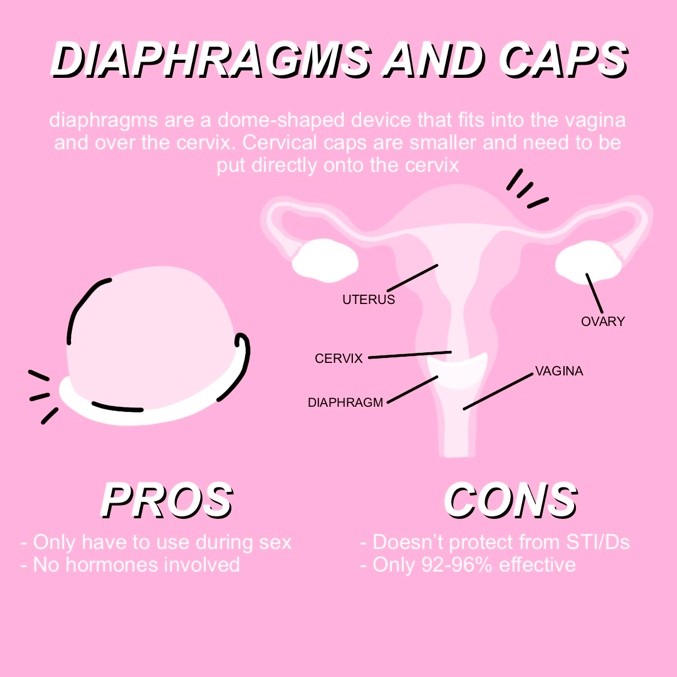
The patch is a small beige patch (5cm by 5cm) that is applied to the skin like a plaster. It releases 2 hormones: oestrogen and progestogen.
Pros – It doesn’t interrupt sex, lasts a week
Cons – Doesn’t protect from STI/Ds, may cause irregular periods, can cause side effects (headaches, nausea, mood swings), it can be seen.
Diaphragms and caps are dome-shaped devices that fit into the vagina and over the cervix. Cervical caps are smaller and need to be put directly onto the cervix.
Pros – Only have to use during sex, no hormones involved
Cons – Doesn’t protect from STI/Ds, only 92-96% effective
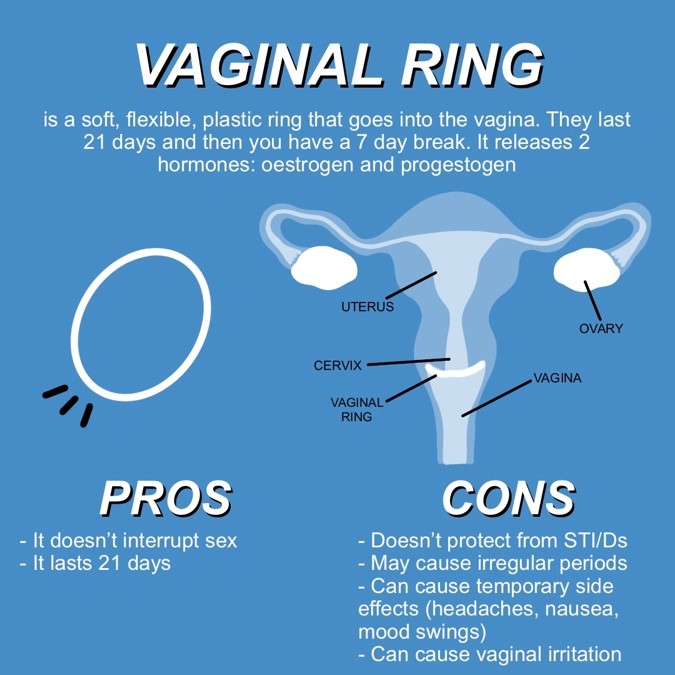
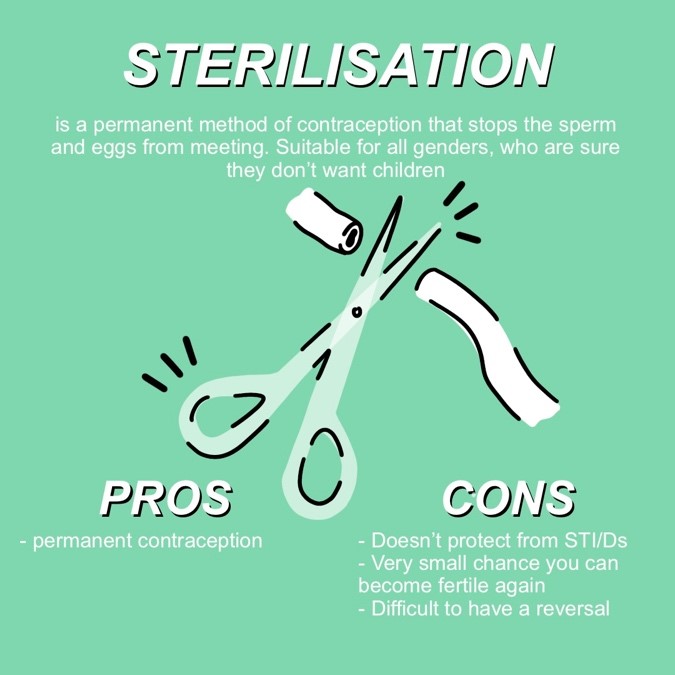
Vaginal ring is a soft, flexible, plastic ring that goes into the vagina. They last 21 days and then you have a 7 day break. It releases 2 hormones: oestrogen and progestogen.
Pros – It doesn’t interrupt sex, it lasts 21 days
Cons – Doesn’t protect from STI/Ds, can cause temporary side effects (headaches, nausea, mood swings), can cause vaginal irritation and irregular discharge, may cause irregular periods.
Sterilisation is a permanent method of contraception that stops the sperm and eggs from meeting. Suitable for all genders, who are sure they don’t want children.
Pros – Permanent contraceptive
Cons – Doesn’t protect from STI/Ds, very small chance you can become fertile again, difficult to have a reversal.
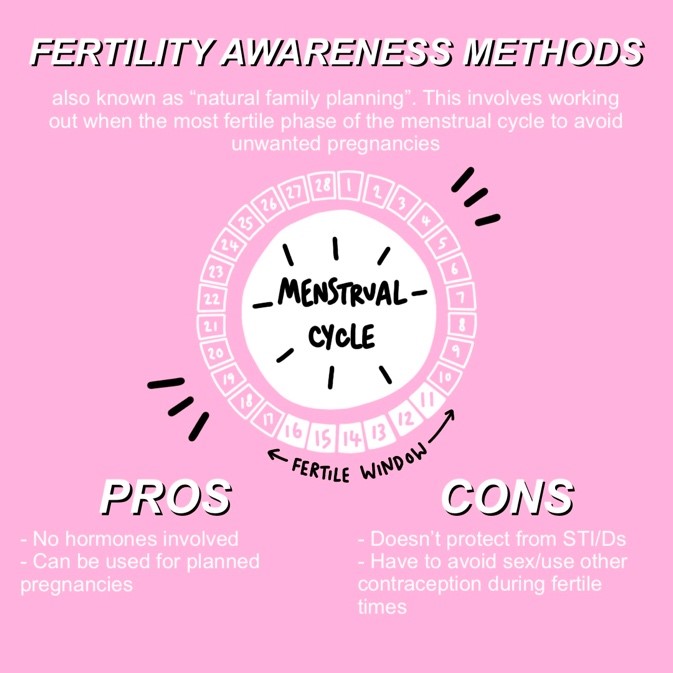
Fertility awareness methods are also known as “natural family planning”. This involves working out when the most fertile phase of the menstrual cycle to avoid unwanted pregnancies.
Pros – No hormones involved, can be used for planned pregnancies
Cons – Doesn’t protect from STI/Ds, have to avoid sex/use other contraception during fertile times

Contraceptives affect people differently, so it may take a few weeks/months/years to find a contraceptive that works best for you.
A lot of contraceptives include hormones, which can cause mental health side effects, such as mood swings and depressed moods.
There are SO many different contraceptives out there, so don’t panic if one is not agreeing with your body, as there will most likely be one that will!
Where to go for more support
Click here to find your nearest sexual health clinic or book an appointment at your local GP to discuss contraceptive options and find what will work best for you.
Here are some great resources that offer great advice and information all things sexual health;
Relate - Who support people with relationship concerns. They also have an anonymous online chat service.
The Brook – A great charity for young people who want to confidentially discuss sexual health and relationship advice.
The Mix – A site filled with information and resources on pretty much anything for young people.
Rise Above – A place to find great stories and advice about relationships and consent.
The Bish – A great guide to sex and love for everyone over 14.
Words and illustrations by: Daisy Wakefield





